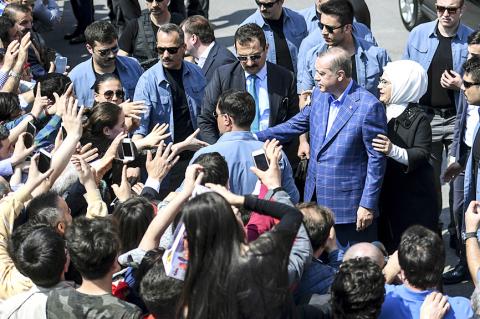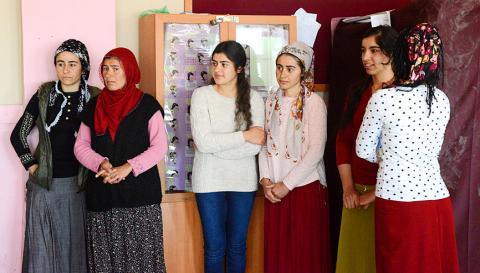Turkey was voting yesterday to decide whether to expand Turkish President Recep Tayyip Erdogan’s powers in a bitterly contested and close referendum he said would determine the future of the country.
More than 55.3 million Turks are eligible to vote on sweeping changes to the president’s role which, if accepted, would grant Erdogan more power than any Turkish leader since its founder Mustafa Kemal Ataturk and his successor, Ismet Inonu.
Polling stations opened in the east of the country at 7am, while voting in Istanbul, Ankara and other cities got under way an hour later. The last polls close at 5pm, with first results expected shortly afterward.

Photo: AP
Opinion polls, always treated with caution in Turkey, predicted wildly divergent scenarios with analysts saying the outcome remains too close to call despite the clear advantage in resources and airtime enjoyed by the “Yes” campaign.
Voting in Istanbul along with his family, Erdogan predicted that “our people would walk to the future” by making the right choice.
After a bitterly contested campaign that saw insults flung in both directions, Turkish Prime Minister Binali Yildirim said: “Whatever choice comes out on top, our nation will make the most beautiful decision.”

Photo: AFP
The opposition has cried foul that the referendum has been conducted on unfair terms, with “Yes” posters ubiquitous on the streets and opposition voices squeezed from the media.
The poll is also taking place under a state of emergency that has seen 47,000 people arrested in an unprecedented crackdown after an attempted coup last year.
“We are voting for Turkey’s destiny,” said Republican People’s Party (CHP) leader Kemal Kilicdaroglu, the standard-bearer of the “No” camp. “God willing, the result will be auspicious and we will all have the chance to determine Turkey’s fundamental problems.”
If passed, the new presidential system would dispense with the office of prime minister and centralize the entire executive bureaucracy under the president, giving Erdogan the direct power to appoint ministers. The system would come into force after the elections in November 2019.

The US government has signed defense cooperation agreements with Japan and the Philippines to boost the deterrence capabilities of countries in the first island chain, a report by the National Security Bureau (NSB) showed. The main countries on the first island chain include the two nations and Taiwan. The bureau is to present the report at a meeting of the legislature’s Foreign Affairs and National Defense Committee tomorrow. The US military has deployed Typhon missile systems to Japan’s Yamaguchi Prefecture and Zambales province in the Philippines during their joint military exercises. It has also installed NMESIS anti-ship systems in Japan’s Okinawa

‘WIN-WIN’: The Philippines, and central and eastern European countries are important potential drone cooperation partners, Minister of Foreign Affairs Lin Chia-lung said Minister of Foreign Affairs Lin Chia-lung (林佳龍) in an interview published yesterday confirmed that there are joint ventures between Taiwan and Poland in the drone industry. Lin made the remark in an exclusive interview with the Chinese-language Liberty Times (the Taipei Times’ sister paper). The government-backed Taiwan Excellence Drone International Business Opportunities Alliance and the Polish Chamber of Unmanned Systems on Wednesday last week signed a memorandum of understanding in Poland to develop a “non-China” supply chain for drones and work together on key technologies. Asked if Taiwan prioritized Poland among central and eastern European countries in drone collaboration, Lin

TRAGEDY STRIKES TAIPEI: The suspect died after falling off a building after he threw smoke grenades into Taipei Main Station and went on a killing spree in Zhongshan A 27-year-old suspect allegedly threw smoke grenades in Taipei Main Station and then proceeded to Zhongshan MRT Station in a random killing spree that resulted in the death of the suspect and two other civilians, and seven injured, including one in critical condition, as of press time last night. The suspect, identified as a man surnamed Chang Wen (張文), allegedly began the attack at Taipei Main Station, the Taipei Fire Department said, adding that it received a report at 5:24pm that smoke grenades had been thrown in the station. One man in his 50s was rushed to hospital after a cardiac arrest

ON ALERT: Taiwan’s partners would issue warnings if China attempted to use Interpol to target Taiwanese, and the global body has mechanisms to prevent it, an official said China has stationed two to four people specializing in Taiwan affairs at its embassies in several democratic countries to monitor and harass Taiwanese, actions that the host nations would not tolerate, National Security Bureau (NSB) Director-General Tsai Ming-yen (蔡明彥) said yesterday. Tsai made the comments at a meeting of the legislature’s Foreign Affairs and National Defense Committee, which asked him and Minister of National Defense Wellington Koo (顧立雄) to report on potential conflicts in the Taiwan Strait and military preparedness. Democratic Progressive Party (DPP) Legislator Michelle Lin (林楚茵) expressed concern that Beijing has posted personnel from China’s Taiwan Affairs Office to its